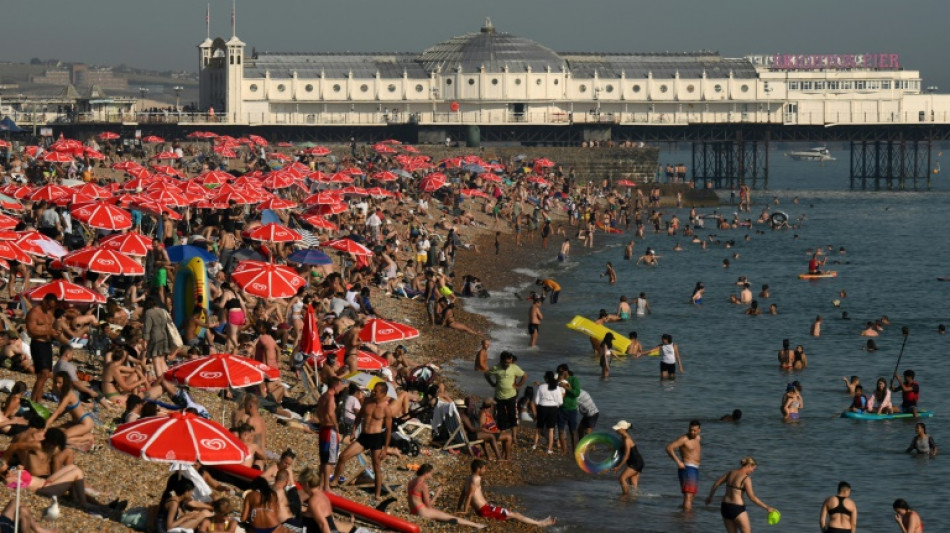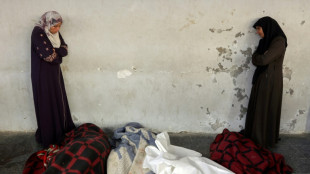
-
 Duffy bowls New Zealand to T20 victory over Sri Lanka
Duffy bowls New Zealand to T20 victory over Sri Lanka
-
Turkey's pro-Kurd party to meet jailed PKK leader on Saturday

-
 Gaza hospital shut after Israeli raid, director held: health officials
Gaza hospital shut after Israeli raid, director held: health officials
-
Surgery for French skier Sarrazin 'went well': federation

-
 Mitchell, Bracewell boost New Zealand in Sri Lanka T20
Mitchell, Bracewell boost New Zealand in Sri Lanka T20
-
Kyrgios says tennis integrity 'awful' after doping scandals

-
 S. Korean prosecutors say Yoon authorised 'shooting' during martial law bid
S. Korean prosecutors say Yoon authorised 'shooting' during martial law bid
-
Vendee Globe skipper Pip Hare limps into Melbourne after dismasting

-
 Reddy's defiant maiden ton claws India back into 4th Australia Test
Reddy's defiant maiden ton claws India back into 4th Australia Test
-
Doubles partner Thompson calls Purcell doping case 'a joke'

-
 Reddy reaches fighting maiden century for India against Australia
Reddy reaches fighting maiden century for India against Australia
-
Sabalenka enjoying 'chilled' rivalry with Swiatek

-
 Political turmoil shakes South Korea's economy
Political turmoil shakes South Korea's economy
-
New mum Bencic wins first tour-level match since 2023 US Open

-
 'Romeo and Juliet' star Olivia Hussey dies aged 73
'Romeo and Juliet' star Olivia Hussey dies aged 73
-
Brown dominates as NBA champion Celtics snap skid

-
 Indian state funeral for former PM Manmohan Singh
Indian state funeral for former PM Manmohan Singh
-
France asks Indonesia to transfer national on death row

-
 Ambitious Ruud targets return to top five in 2025
Ambitious Ruud targets return to top five in 2025
-
Late bloomer Paolini looking to build on 'amazing' 2024

-
 Australia remove Pant, Jadeja as India reach 244-7 at lunch
Australia remove Pant, Jadeja as India reach 244-7 at lunch
-
Scheffler sidelined by Christmas cooking injury

-
 Rice seeks trophies as Arsenal chase down 'full throttle' Liverpool
Rice seeks trophies as Arsenal chase down 'full throttle' Liverpool
-
Trump asks US Supreme Court to pause law threatening TikTok ban

-
 Arsenal edge past Ipswich to go second in Premier League
Arsenal edge past Ipswich to go second in Premier League
-
LawConnect wins punishing and deadly Sydney-Hobart yacht race

-
 Ronaldo slams 'unfair' Ballon d'Or result after Vinicius snub
Ronaldo slams 'unfair' Ballon d'Or result after Vinicius snub
-
Several wounded N.Korean soldiers died after being captured by Ukraine: Zelensky

-
 Fresh strike hits Yemen's rebel-held capital
Fresh strike hits Yemen's rebel-held capital
-
Netflix with Beyonce make splash despite NFL ratings fall

-
 Bird flu mutated inside US patient, raising concern
Bird flu mutated inside US patient, raising concern
-
Slovakia says ready to host Russia-Ukraine peace talks

-
 Maresca challenges Chelsea to react to Fulham blow
Maresca challenges Chelsea to react to Fulham blow
-
Tech slump slays Santa rally, weak yen lifts Japan stocks higher

-
 Test records for Zimbabwe and Williams as Afghanistan toil
Test records for Zimbabwe and Williams as Afghanistan toil
-
LawConnect wins punishing Sydney-Hobart yacht race

-
 Barca's Yamal vows to 'come back better' after ankle injury
Barca's Yamal vows to 'come back better' after ankle injury
-
Olmo closer to Barcelona exit after registration request rejected

-
 Watching the sun rise over a new Damascus
Watching the sun rise over a new Damascus
-
Malaysia man flogged in mosque for crime of gender mixing

-
 Montenegro to extradite crypto entrepreneur Do Kwon to US
Montenegro to extradite crypto entrepreneur Do Kwon to US
-
Brazil views labor violations at BYD site as human 'trafficking'

-
 No extra pressure for Slot as Premier League leaders Liverpool pull clear
No extra pressure for Slot as Premier League leaders Liverpool pull clear
-
Tourists return to post-Olympic Paris for holiday magic

-
 'Football harder than Prime Minister' comment was joke, says Postecoglou
'Football harder than Prime Minister' comment was joke, says Postecoglou
-
Driver who killed 35 in China car ramming sentenced to death

-
 Bosch gives South Africa 90-run lead against Pakistan
Bosch gives South Africa 90-run lead against Pakistan
-
French skier Sarrazin 'conscious' after training crash

-
 NATO to boost military presence in Baltic after cables 'sabotage'
NATO to boost military presence in Baltic after cables 'sabotage'
-
Howe hopes Newcastle have 'moved on' in last two seasons

| RBGPF | 100% | 59.84 | $ | |
| RELX | -0.61% | 45.58 | $ | |
| CMSD | -0.67% | 23.32 | $ | |
| RIO | -0.41% | 59.01 | $ | |
| NGG | 0.66% | 59.31 | $ | |
| SCS | 0.58% | 11.97 | $ | |
| GSK | -0.12% | 34.08 | $ | |
| RYCEF | 0.14% | 7.27 | $ | |
| BTI | -0.33% | 36.31 | $ | |
| VOD | 0.12% | 8.43 | $ | |
| AZN | -0.39% | 66.26 | $ | |
| CMSC | -0.85% | 23.46 | $ | |
| BCC | -1.91% | 120.63 | $ | |
| BCE | -0.93% | 22.66 | $ | |
| BP | 0.38% | 28.96 | $ | |
| JRI | -0.41% | 12.15 | $ |

UK experiencing longest September heatwave
Britain is experiencing a record-breaking period of hot September weather with Friday expected to be the fifth consecutive day of temperatures climbing above 30 degrees Celsius (86 degrees Fahrenheit).
This week has already broken the record for the number of consecutive September days with the temperature topping 30C, according to Britain's Meteorological Office.
The previous record was three consecutive days, seen four times before, most recently in 2016.
"Many areas will remain very warm or hot until at least Saturday, with the heat becoming more confined to southeastern areas on Sunday and Monday," the Met Office said.
Temperatures could reach 32C in southeastern England on Saturday before easing off on Sunday and Monday, the Met Office added.
Thursday was provisionally the hottest day of the year so far with 32.6C recorded in Wisley, Surrey, in southern England.
The temperature surpassed the 32.2C recorded on two days in June.
The hottest ever September day in Britain was recorded back in 1906 when the mercury hit 35.6C in South Yorkshire, northern England.
Enjoying the late summer heatwave, Britons have crowded the beaches in the south of the country, including in the popular seaside town of Brighton.
"I've been in Brighton many times, but this is the first time I see the beach so crowded," Anastasia Nosko, 22, told AFP in the coastal town this week.
An amber health alert is in place until Sunday evening for most of England, with authorities warning of increased risks to the more vulnerable.
The Met Office has said that "as our climate changes due to human influences, hot spells like this are becoming more frequent and severe".
O.Salvador--PC




